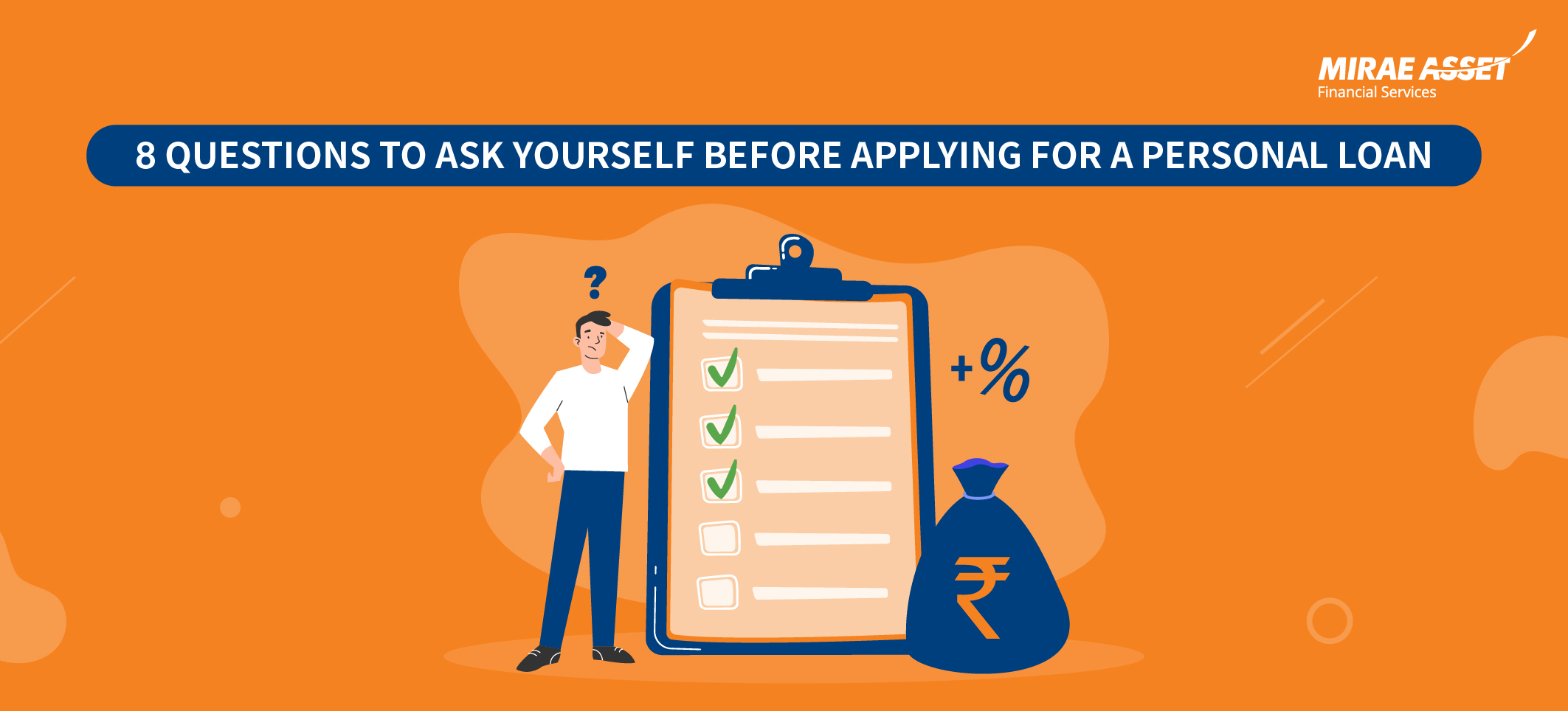8 Questions to Ask Yourself Before Applying for a Personal Loan

A personal loan can help you to manage your expenses by raising funds without any collateral. But before applying for the loan, it’s important to ask yourself the right questions to ensure that you’re borrowing responsibly and won’t be regretting your decisions later. Here are the essential questions you must ask before availing a personal loan.

To Get Started With Your Personal Loan Application
1. What do I need the personal loan for?
Before availing a personal loan, ask yourself: Why do I need this money? Whether it is for a medical emergency, home renovation, education, or consolidating existing debt, you should know the purpose clearly and ensure the loan is being used for a genuine and productive reason. Never use personal loans for speculative activities like investing in capital markets, sports betting, or card gambling. Loans used for irresponsible purposes can lead to financial instability and serious consequences.
2. Do I afford the monthly payments?
This is one of the most important questions to ask. List down your monthly income and expenses including rent, groceries, bills, existing EMIs, and upcoming financial commitments. Once that’s done, check if there’s enough room to accommodate your personal loan EMI comfortably. If the EMI takes up a large chunk of your disposable income, you may struggle to manage it. Being realistic at this stage can prevent missed payments and future financial stress.
3. What is my credit score?
Your credit score plays a crucial role in loan approval and interest rates. Check your credit score before applying. A good score (700 and above) usually results in better offers. If your score is low, it’s better to check the lender’s requirements first instead of making multiple loan applications. Applying to too many lenders at once can reduce your score further, making you look credit-hungry. Apply only with those lenders whose eligibility criteria you meet.
4. Have I compared lenders and their offers?
Interest rates, processing fees, prepayment charges, and customer service can vary significantly across lenders. Don’t go with the first offer you receive. Instead, compare options from multiple banks and NBFCs. Use online loan comparison platforms or speak to financial advisors if needed. Picking the wrong lender can cost you more overtime. A little research now can help you save significantly over the loan’s tenure and ensure a smoother experience.

To Get Started With Your Personal Loan Application
5. Is the lender genuine? Are they RBI registered?
It’s critical to verify if the lender is registered with the RBI. Many fraudulent apps and companies pose as lenders and charge hidden fees, outrageous interest rates, or even harass borrowers. Always check the lender’s website, app, reviews and whether they appear on the RBI’s list of approved NBFCs or banks. Avoid apps and lenders that are not transparent about their terms. Choosing a credible lender ensures safety, better service, and legal protection.
6. What are all the charges and fees associated with the loan?
Checking the interest rate alone is not enough. Personal loan involves processing fees, late payment charges, foreclosure penalties, and more. Read the terms and conditions carefully. Ask your lender to explain all the fees involved if something is not clear. Understanding the full cost of borrowing helps you avoid surprises later. Transparency is the key. If a lender is vague or evasive about charges, that’s a red flag, you should consider other options.
7. Do I have a repayment plan?
A personal loan is a commitment. Before borrowing, map out how you plan to repay the EMIs without affecting your other priorities. If you don’t have a repayment plan, there is a possibility that you fall into a debt trap, borrowing more to repay existing loans. Avoid mindless borrowing and stick to your budget. A clear plan helps you stay financially disciplined and ensures that the loan serves its intended purpose without causing any stress.
8. How much money should I borrow?
You may be eligible for a high loan amount, but that doesn’t mean you should take it. Borrow only what you need. Taking more than necessary can lead to higher EMIs and interest outgo. It might seem tempting to have extra funds for pending “good to have,” needs but it comes at a cost. A lower loan amount is always more manageable and less burdensome on your finances.
Conclusion:
Personal loan is a very helpful tool to manage your finances, when used wisely, but only if you’ve asked yourself the right questions first. Be informed, and do your own research before proceeding. Take your time, evaluate your needs, and never borrow just because you can. Borrow smart, repay comfortably, and stay financially secure.

